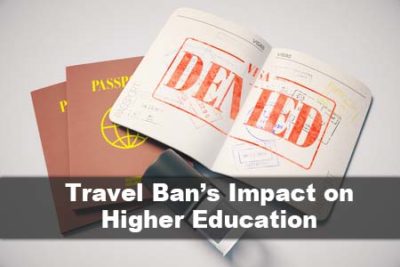Travel Ban’s Impact on Higher Education
On January 27, 2017, President Trump enacted a travel ban executive order to suspend for 90 days the entry of “certain aliens from seven countries: Iran, Iraq, Libya, Somalia, Sudan, Syria, and Yemen.”
While this original order was suspended by the Supreme Court, it was reinstated in March to exclude Iraq as well as allow current U.S. visa-holding citizens from these countries, including international students enrolled in U.S. college institutions, to remain in the U.S. and continue traveling between the two countries. This controversial executive order has been subject to heated debate, and while many citizens argue that the order protects the U.S. from potential acts of terror, higher education administrators who directly serve the international student community fear that the order will have a negative impact on the U.S. higher education system and international community. (Whitehouse.gov)
Galina Peshkova © 123RF.com
Why is International Education Important?
The United States has historically been a leader in international education enrollment, and international students have significantly increased in presence on U.S. college campuses. According to the Migration Policy Institute (MPI), the U.S. hosted more of the 4.1 million international students than any other country in 2013. Moreover, international student enrollment in the U.S. in 2014 increased by 10%, reaching 975,000 students, the most significant increase in international student population that the U.S. had seen in 35 years. Before we take a further look at the implications of the current travel ban executive order on international education, however, let’s take a very brief moment to reflect on why international education is such an integral part of the U.S. higher education system.
On a strictly objective and quantifiable level, international student enrollment in U.S. colleges has a significantly positive fiscal impact on higher education institutions and the American economy. Not only do international students pay full tuition, they also spend money on housing and other good while studying the U.S. According to the Wall Street Journal, international students contributed roughly $30 billion to the American economy in the 2014-2015 academic year. Furthermore, results from a study conducted by College Factual suggest that international students from the countries impacted by the executive order currently account for around $700 million of tuition costs at U.S. college institutions.
International students also bring unique perspectives from their home country and culture, and help create dynamic and diverse campuses around the country that help foster mutual understanding and build relationships between the United States and countries around the world. Applicable to the current executive order to counter terrorism, NAFSA released a report following the September 11 attacks in which they argue, “U.S. openness to international students is integral to America’s security in today’s world. International student exchanges are part of the solution to terrorism, not part of the problem.”
Perceived Impact on Higher Education
So how exactly will the current travel ban executive order impact international education in the U.S.? At this point, it is perhaps too early to discuss long-term impacts, but at the moment it is clear that there is cause of concern among international education administrators at college campuses across the country.
Mary Sue Coleman, President of the Association of American Universities (AAU), released a statement on the new executive order on March 6th, 2017, in which she states the following: “… although we firmly agree with President Trump that it is essential that the federal government protect our country from those who would harm it, we remain concerned that the new order, like its predecessor, poses a fundamental long-term threat to America’s global leadership in higher education, research, and innovation. “ Coleman then asserts, “Perhaps most alarmingly, this order conveys the same damaging message to talented people from the six affected countries, as well as others: you are no longer welcome here.”
The American Association of Collegiate Registrars and Admissions Officers (AACRAO) attempted to capture the immediate short-term impact of the executive order in a recent survey. Researchers in this study compiled data from 300 survey respondents, the majority of whom were institution-based professionals involved in international student recruitment in the U.S. Their responses are based on their experience working directly with international students and their families. The most common concerns researchers in this study identified were:
- A perceived rise of student visa denials at U.S. embassies and consulates in China, India and Nepal.
- A perceived climate in the U.S. in which international students are less welcome.
- A perception that visa restrictions (i.e. ability to travel and employment) could change.
- A perception that other countries could be added to the travel ban.
Many institutions report a decline in applications from the Middle East, both for undergraduates and graduates. Moreover, a significant amount of institutions report a decline in international student applications from India and China, both countries of which currently account for about 47% of current international student enrollment.
While President Trump’s intention of the travel ban executive order may not have been directly aimed at international students, it has undeniably caused significant concerns on college campuses across the U.S. and to prospective future international students from around the world. Hopefully the direct impact of the executive order continues to be researched, so that implications for policy modification and improvement might be considered by policy makers.

